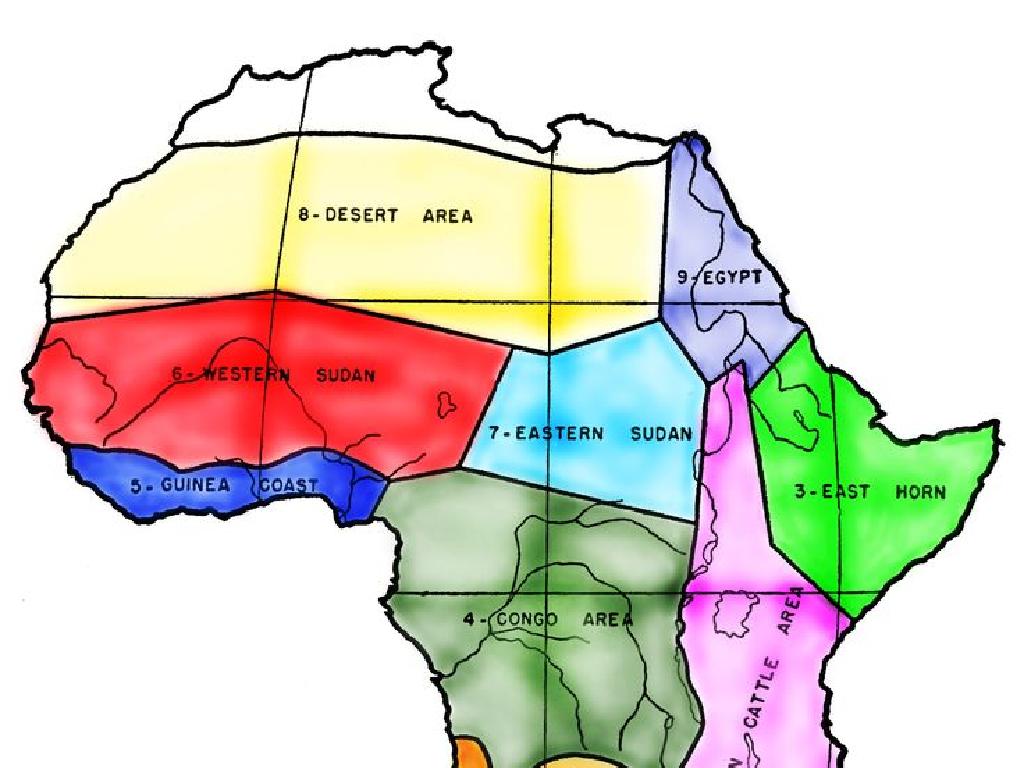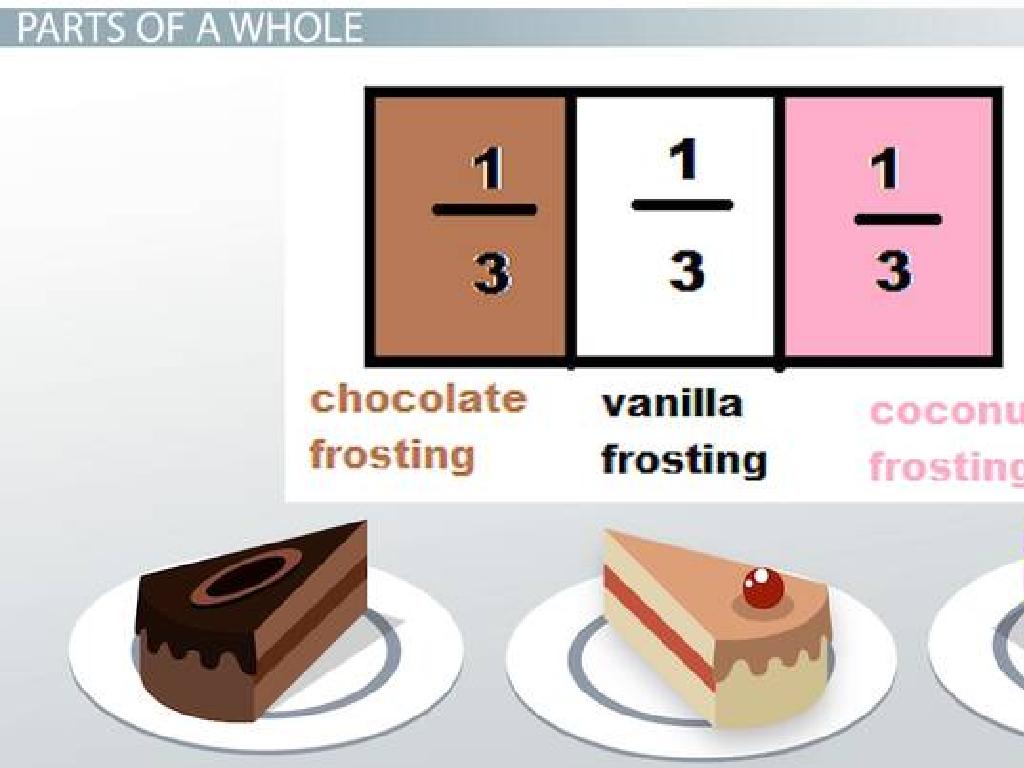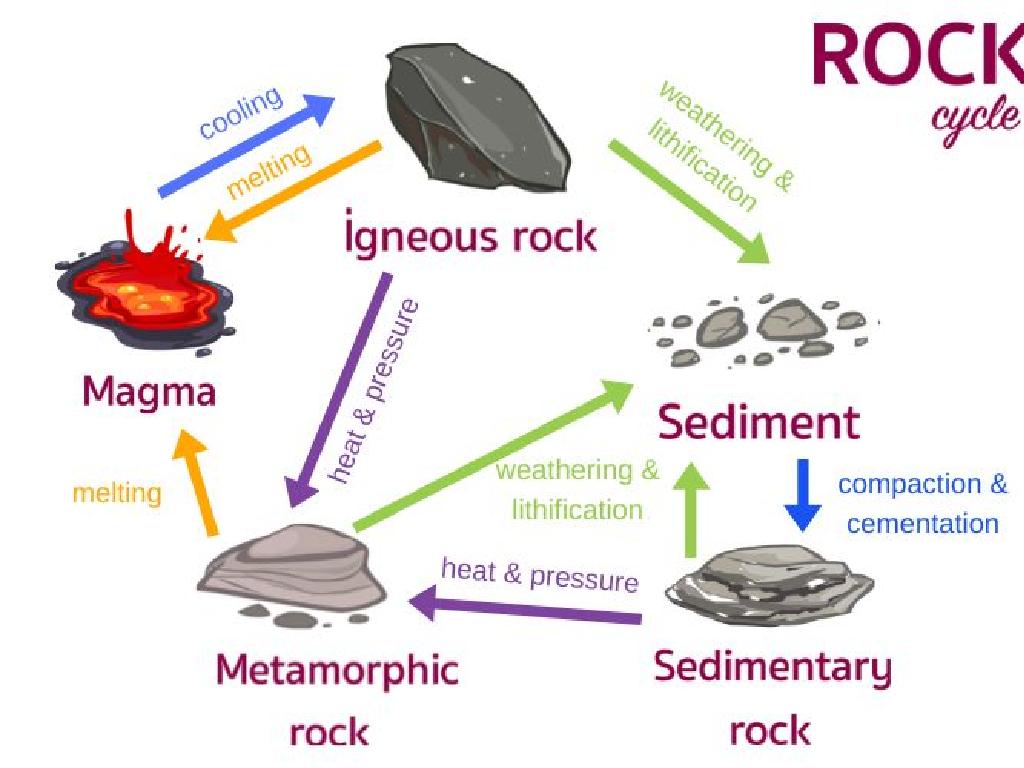Determine The Meanings Of Words With Greek And Latin Roots
Subject: Language arts
Grade: Third grade
Topic: Greek And Latin Roots
Please LOG IN to download the presentation. Access is available to registered users only.
View More Content
Uncovering Word Origins: Greek and Latin Roots
– Discover word formation
– Words are like puzzles, made of smaller parts
– Significance of Greek and Latin roots
– These roots are the building blocks for many words
– Examples of common roots
– ‘bio’ means life, ‘geo’ means earth
– Practice finding roots in words
– Spot roots in daily words like ‘biology’ or ‘geography’
|
This slide introduces students to the concept of word formation through the study of Greek and Latin roots, which are foundational elements in many English words. Emphasize the importance of understanding these roots to enhance vocabulary and comprehension. Provide examples of common roots such as ‘bio’ (life) and ‘geo’ (earth), and show how they form part of larger words like ‘biology’ (the study of life) and ‘geography’ (the study of earth). Encourage students to practice finding and recognizing these roots in words they encounter in their daily lives, which will help them deduce the meanings of unfamiliar words. This foundational skill will aid them in reading comprehension and vocabulary acquisition across all subjects.
Exploring Word Roots
– Roots: Word Building Blocks
– Roots are the base part of words that give them meaning.
– Greek & Latin Roots in English
– Many English words are made from Greek and Latin roots.
– Examples: Roots and Meanings
– ‘Tele’ means far, ‘photo’ means light. ‘Telephoto’ combines both.
– Discovering Roots in Words
– Find roots in everyday words and see what they mean.
|
This slide introduces the concept of word roots to third-grade students, focusing on Greek and Latin origins. Roots are the fundamental parts of words that carry meaning and can help in understanding unfamiliar vocabulary. By learning common Greek and Latin roots, students can begin to decipher the meanings of many English words. Provide examples such as ‘tele’ (far) and ‘photo’ (light) to illustrate how roots combine to form new words. Encourage students to become word detectives, looking for roots in words they encounter in their reading or daily life. This foundational knowledge will enhance their vocabulary and reading comprehension skills.
Discovering Word Families
– Roots form word families
– Words with the same root are like siblings in a family.
– Roots hint at word meanings
– A root can tell us what a word is about, like ‘spect’ means to look.
– Activity: Find root relatives
– Look for words that share the same root and see how they are related.
– Share your word discoveries
– We’ll discuss as a class the words you find and their roots.
|
This slide introduces students to the concept of word families based on common Greek and Latin roots. Explain that just like family members are related, words with the same root are connected and can give us hints about their meanings. For the activity, students will identify words that share the same root and write them down. This will help them understand how a root word forms the basis of many words and how it provides clues to their meanings. Encourage students to think of as many ‘relatives’ of the root word as they can. In the next class, we’ll share and discuss these words, reinforcing the concept of word families and expanding their vocabulary.
Exploring Greek Roots: ‘tele’
– ‘tele’ means ‘far’
– Words: ‘telephone’, ‘telescope’
– ‘telephone’: sound from far
– ‘television’ also has ‘tele’
– ‘telescope’: see far away objects
– Match roots to meanings
– Find other words with ‘tele’ and what they mean
|
This slide introduces the Greek root ‘tele,’ which means ‘far.’ Start by explaining what roots are and how they form the basis of many words. Show how ‘tele’ is used in words like ‘telephone’ (sound from far), ‘telescope’ (see far away objects), and ‘television’ (vision from far). For the activity, provide students with a list of Greek roots and their meanings for them to match. Encourage them to think of other words that might contain the root ‘tele.’ This activity will help students understand the concept of word roots and how they can help in determining the meaning of new words. It’s a fun way for them to expand their vocabulary by connecting words they already know to the root meanings.
Exploring Latin Roots: ‘scrib’
– ‘scrib’ means ‘write’
– Examples: ‘describe’, ‘manuscript’
– ‘Describe’: to write down what something is like
– ‘Inscription’ uses ‘scrib’
– ‘Inscription’: writing engraved on something
– Activity: Make new words
– Use ‘scrib’ to form new words and share them
|
This slide introduces the concept of Latin roots to third-grade students, focusing on the root ‘scrib,’ which means ‘write.’ Start by explaining what roots are and how they form the basis of many words in the English language. Provide examples like ‘describe,’ which means to write down the details of something, and ‘manuscript,’ which refers to a document written by hand. ‘Inscription’ is another example where ‘scrib’ is used to mean writing that is engraved or etched onto a surface. For the activity, encourage students to get creative and come up with new words using the root ‘scrib.’ They can think about actions related to writing or ways of writing and share their new words with the class. This activity will help reinforce their understanding of word formation and the importance of Greek and Latin roots in English.
Practice Time: Exploring ‘astro’
– Let’s play with words!
– Solve word puzzles together
– Group activity time
– Work in teams to find words with ‘astro’
– Search for ‘astro’ words
– ‘Astronaut’, ‘astronomy’ – what else?
|
This slide introduces a fun and interactive group activity for the class. The objective is to reinforce the understanding of Greek and Latin roots by focusing on the root ‘astro’, which means ‘star’. Divide the class into small groups and challenge them to find as many words as they can that contain this root. Provide examples like ‘astronaut’ and ‘astronomy’ to get them started. This activity encourages teamwork and critical thinking as students discuss and explore language together. For the teacher: Prepare a list of words with the root ‘astro’ to help guide the activity if students get stuck, and consider rewards for the group that finds the most words to motivate participation.
The Power of Greek and Latin Roots
– Roots help understand new words
– Like clues to a word’s meaning
– Roots grow your vocabulary
– Knowing roots makes learning words easier
– Discuss roots’ impact on words
– Think about how roots helped you with hard words
– Share how roots change word views
|
This slide introduces the concept of Greek and Latin roots and their importance in understanding and expanding vocabulary. Begin by explaining that roots are the basic parts of words that give hints to their meanings. Show how a single root can be found in many words and how this helps in learning new vocabulary. Engage the class in a discussion about how recognizing these roots has changed the way they look at words. Encourage students to share personal experiences or examples of when knowing a root helped them figure out the meaning of a new word. This will help students see the practical benefits of learning roots and motivate them to pay attention to these when encountering new vocabulary.
Let’s Review: Greek and Latin Roots
– Recap of roots learned today
– Roots help understand English
– Roots are word parts that give clues to a word’s meaning
– Quick quiz on word roots
– What is the root of ‘biography’? What does it mean?
– Discuss ‘biography’, ‘geology’, ‘aquarium’
– ‘bio’ means life, ‘graph’ means write; ‘geo’ means earth, ‘logy’ means study; ‘aqua’ means water, ‘rium’ is a place for
|
This slide aims to consolidate the day’s learning about Greek and Latin roots. Begin by recapping the roots discussed in the lesson, emphasizing their importance as building blocks in the English language. Explain how understanding these roots can help students decipher the meaning of new words. Engage the class with a quick quiz, asking them to identify the root and meaning of words like ‘biography’, ‘geology’, and ‘aquarium’. For ‘biography’, discuss how ‘bio’ (life) and ‘graph’ (write) combine to mean ‘writing about someone’s life’. For ‘geology’, explain that ‘geo’ (earth) and ‘logy’ (study) mean ‘the study of the earth’. Lastly, ‘aquarium’ comes from ‘aqua’ (water) and ‘rium’ (a place for), meaning ‘a place for water life’. Encourage students to use these roots to figure out meanings of other words they encounter.
Class Activity: Root Exploration
– Pick a Greek or Latin root in groups
– List words with the chosen root
– Find words like ‘telegraph’ or ‘telephone’ for ‘tele-‘ (far)
– Present your word list to the class
– Discuss root-word connections
– How does ‘tele-‘ link these words?
|
This activity is designed to help students understand the concept of Greek and Latin roots in words. Divide the class into small groups and assign each group a different root, or let them choose one. Provide guidance on how to look for words that contain their chosen root and encourage them to use dictionaries or the internet. Each group will make a list of words and then present their findings to the class, explaining how the root they’ve chosen is the base of each word and how it contributes to the word’s meaning. For example, ‘tele-‘ means ‘far,’ so in ‘telephone,’ it refers to hearing sound from far away. This activity will enhance their vocabulary and decoding skills for unfamiliar words.
Roots Wrap-Up and Homework Fun!
– Celebrating our roots learning journey
– Roots in our future reading and writing
– Homework: Craft a root-rich story
– Write a creative story using your new words
– Include 10 words with Greek or Latin roots
– Find and use at least 10 words from our roots list
|
Well done to all the students for exploring the world of Greek and Latin roots! Understanding these roots will help you decode many English words and expand your vocabulary. For homework, let your imagination run wild and create a short story. Make sure to weave in at least 10 new words that contain the Greek or Latin roots we’ve learned. This will help you remember these roots and recognize them in other words. Teachers, provide a list of root words for reference and encourage creativity. Offer examples like ‘telephoto’, ‘microphone’, or ‘aquarium’ to get them started. This activity will reinforce their learning and show them the practical application of understanding word roots.





/eighth_grade_research_skills.jpg)
